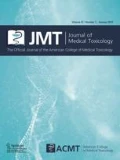I would like to applaud the authors for their recent investigation considering “wartime toxicology” [1]. All of us who practice medical toxicology firmly recognize that our subspecialty is not going away, unfortunately, however, in light of the current geopolitical landscape, neither are war, downrange missions, and the necessity for military physicians in a combat zone of operation.
Globally, exposures and poisoning have proven to be an equal opportunity phenomenon. I quickly appreciated this on my first day of work in a combat support hospital in Kandahar, Afghanistan. Just prior to my arrival, several military personnel required decontamination from being heavily exposed to kerosene and monomethylhydrazine while refueling an F-16. After decontamination and stabilization, many questions were presented regarding chronic toxicity and risk. During rounds on day 1, I heard the presentation of a soldier who was found “sleepy” while “cleaning his rifle” with a computer keyboard cleaner. My colleagues had never heard of inhalant abuse with 1,1-difluoroethane. After confronted, the soldier confessed to abusing the product as a substitute for the drugs he was unable to obtain during his deployment.
While it is true that medical providers deployed to remote locations must diagnose and treat exposures rarely seen in developing countries (e.g., foreign envenomations), I would also submit that a number of typical questions may arise from poisoning scenarios one commonly confronts here at home. Questions I personally addressed while mobilized included how to manage supplement and anabolic steroid abuse, psychiatric medication overdose, how to manage acetaminophen exposure without being able to check a concentration, how to interpret the results of a urine qualitative toxicology screen, and how long should supportive measures be utilized when a patient is presumably brain dead after overdose. Additionally, making decisions when or if patients should receive medevac was vital for patient care and mission stability.
The Army Knowledge Online (AKO) teleconsultation program has proven to be a valuable resource in a deployed setting. For the exposed or poisoned patient, however, there is a great need to further improve this service. One important limitation is the lack of instantaneous dialogue. The need for consultants to review emails in a timely way in order to offer opportune recommendations poses a critical disadvantage. I could not agree more with the authors who state that a civilian medical toxicology teleconsultation service to assist in these cases would be beneficial for those in remote locales. Utilizing US poison centers more regularly to provide real-time expertise would make the most sense. As a medical toxicologist who has served in such a setting (and speaking for my brothers and sisters who have done the same), I would agree to be the first to volunteer for this substantial service.
Reference
Maddry JK, Sessions D, Heard K, et al. Wartime toxicology: evaluation of a military medical toxicology telemedicine consults service to assist physicians serving overseas and in combat (2005-2012). J Med Toxicol. 2014;10(3):261–5.
Conflict of Interest
The author has no conflicts of interest to disclose.
Author information
Authors and Affiliations
Corresponding author
Rights and permissions
About this article
Cite this article
Bryant, S.M. Wartime Toxicology: Perspectives from a Downrange Medical Toxicologist. J. Med. Toxicol. 11, 157 (2015). https://doi.org/10.1007/s13181-014-0447-7
Published:
Issue Date:
DOI: https://doi.org/10.1007/s13181-014-0447-7

